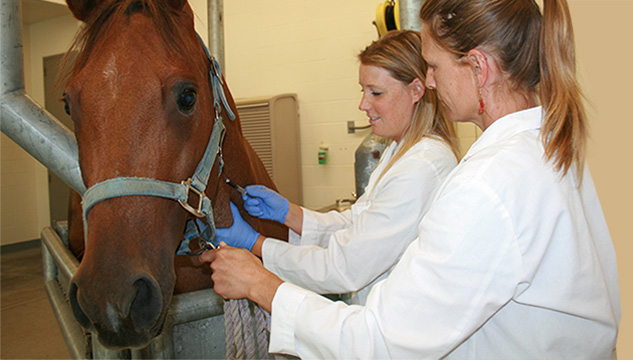
This summer Lainie Kringen wanted to do something completely different.
The previous five summers the third year veterinary medicine student at Iowa State University has gone back home in Madison, S.D., where she worked in a local veterinary clinic with primary responsibilities with beef cattle.
This summer, Lainie stayed in Ames and participated in the annual Summer Scholars Research Program in the College of Veterinary Medicine. The program introduces veterinary medicine students to research in a wide array of areas including clinical medicine, animal science, public health, neuroscience and immunology.
In keeping with her goal of trying something different, Lainie is part of a research project focusing on skin cancer in horses.
“I spent every second I could on my grandpa’s dairy farm and they tell me I was following the vet around when I was five years old so I guess I’ve always known what I wanted to do,” she said. “And since we’ve always had horses when I was growing up it was easy for me to integrate into this area of veterinary medicine this summer.
“The partners at the veterinary clinic in Madison actually encouraged me to do this. They said I needed to diversify my experiences before I got into practice.”
Horses can develop skin cancer. This particular study has seen cancer all over the horses’ bodies from the legs to the tail ends and even on the eyelids. Although generally not life threatening if treated in time, the tumors can be very bothersome to the horse, particularly around the eye.
The study, which is under the direction of Dr. Stephanie Caston, an equine surgeon, includes horses from a variety of disciplines, backgrounds, breeds and ages. The study aims to evaluate and compare the effectiveness of anti-CD47 antibodies versus a control treatment on skin tumor size reduction in horses. The horses are treated once with the control or the antibody and are monitored for the next two days. They then come back on days 14 and 30 for their checkups and tumor measurements.
“I was interested in becoming a part of this project because it was on the clinical side and not as much work in the lab,” Lainie said. “I’m actively drawing blood from the animals, doing biopsies and working with clients – all things I will use in my career.”
The study has given Lainie insights on how to communicate with clients. She says she has needed to become more specific in her requests.
“I asked one client to send me a photo of her horse and I get back a photo of the client riding her horse when I actually wanted a photo of the tumor,” she said. “It’s been a great learning experience.
“I am so grateful to have the opportunity to do this. I couldn’t have asked for a better instructor than Dr. Caston. She’s been very patient with me, answering all my questions at all hours of the day.”
